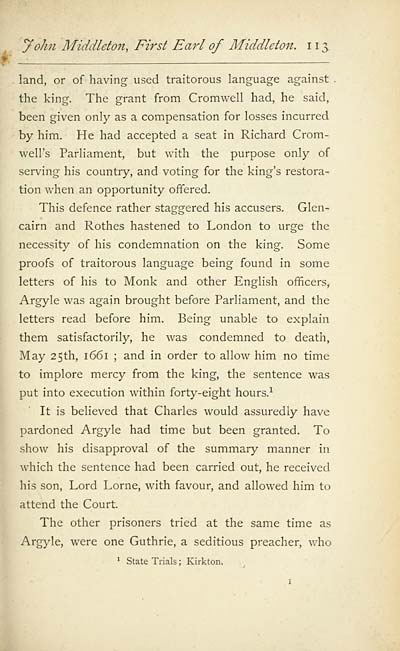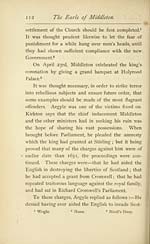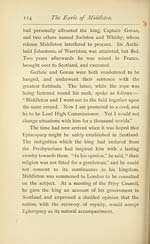Download files
Complete book:
Individual page:
Thumbnail gallery: Grid view | List view

yohn Middleton, First Earl of Middle ton. 1 1 3
land, or of having used traitorous language against
the king. The grant from Cromwell had, he said,
been given only as a compensation for losses incurred
by him. He had accepted a seat in Richard Crom-
well's Parliament, but with the purpose only of
serving his country, and voting for the king's restora-
tion when an opportunity offered.
This defence rather staggered his accusers. Glen-
cairn and Rothes hastened to London to urge the
necessity of his condemnation on the king. Some
proofs of traitorous language being found in some
letters of his to Monk and other English officers,
Argyle was again brought before Parliament, and the
letters read before him. Being unable to explain
them satisfactorily, he was condemned to death,
May 25th, 1661 ; and in order to allow him no time
to implore mercy from the king, the sentence was
put into execution within forty-eight hours. 1
It is believed that Charles would assuredly have
pardoned Argyle had time but been granted. To
show his disapproval of the summary manner in
which the sentence had been carried out, he received
his son, Lord Lome, with favour, and allowed him to
attend the Court.
The other prisoners tried at the same time as
Argyle, were one Guthrie, a seditious preacher, who
1 State Trials ; Kirkton.
land, or of having used traitorous language against
the king. The grant from Cromwell had, he said,
been given only as a compensation for losses incurred
by him. He had accepted a seat in Richard Crom-
well's Parliament, but with the purpose only of
serving his country, and voting for the king's restora-
tion when an opportunity offered.
This defence rather staggered his accusers. Glen-
cairn and Rothes hastened to London to urge the
necessity of his condemnation on the king. Some
proofs of traitorous language being found in some
letters of his to Monk and other English officers,
Argyle was again brought before Parliament, and the
letters read before him. Being unable to explain
them satisfactorily, he was condemned to death,
May 25th, 1661 ; and in order to allow him no time
to implore mercy from the king, the sentence was
put into execution within forty-eight hours. 1
It is believed that Charles would assuredly have
pardoned Argyle had time but been granted. To
show his disapproval of the summary manner in
which the sentence had been carried out, he received
his son, Lord Lome, with favour, and allowed him to
attend the Court.
The other prisoners tried at the same time as
Argyle, were one Guthrie, a seditious preacher, who
1 State Trials ; Kirkton.
Set display mode to:
![]() Universal Viewer |
Universal Viewer | ![]() Mirador |
Large image | Transcription
Mirador |
Large image | Transcription
Images and transcriptions on this page, including medium image downloads, may be used under the Creative Commons Attribution 4.0 International Licence unless otherwise stated. ![]()
| Histories of Scottish families > Earls of Middleton, Lords of Clermont and of Fettercairn > (129) |
|---|
| Permanent URL | https://digital.nls.uk/95312527 |
|---|
| Description | A selection of almost 400 printed items relating to the history of Scottish families, mostly dating from the 19th and early 20th centuries. Includes memoirs, genealogies and clan histories, with a few produced by emigrant families. The earliest family history goes back to AD 916. |
|---|

